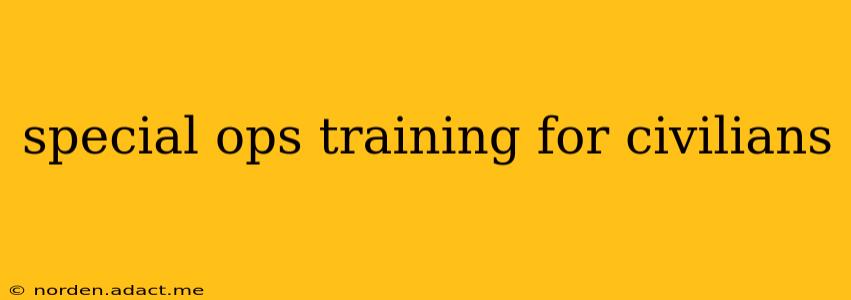The allure of special operations training is undeniable. The skills, discipline, and mental fortitude associated with these elite units fascinate many, leading civilians to seek similar training. However, accessing authentic special forces training is strictly limited. This guide explores the options available to civilians interested in honing similar skills, addressing common questions and misconceptions.
What is Special Ops Training?
Special operations training is notoriously rigorous and demanding, pushing individuals far beyond their perceived limits. It's not just about physical fitness; it encompasses tactical skills, mental resilience, teamwork, and adaptability. The specific training varies considerably depending on the unit and mission, but commonly includes:
- Advanced physical fitness: Endurance, strength, and agility are paramount. Training often involves intense physical challenges, exceeding the demands of standard military physical training.
- Weapons training: Proficiency with various firearms, including handguns, rifles, and potentially explosives, is essential.
- Tactical skills: This includes close-quarters combat (CQB), marksmanship, reconnaissance, navigation, and survival skills.
- Teamwork and leadership: Special operations necessitate seamless coordination and collaboration within a team, demanding strong leadership qualities.
- Mental and psychological resilience: The ability to cope with high-stress situations, maintain composure under pressure, and make critical decisions under duress is crucial.
Can Civilians Access Authentic Special Ops Training?
No, civilians cannot directly access the same training provided to actual special operations forces. This training is classified, highly specialized, and requires extensive background checks and security clearances. Attempting to access such training illegally could have serious legal consequences.
What are the Alternatives for Civilians?
While direct access to official Special Ops training is impossible, several alternatives exist for civilians seeking to develop similar skills:
H2: What kind of civilian training programs are available?
Many reputable civilian organizations offer training programs focused on specific aspects of special operations training. These programs typically emphasize practical skills and physical fitness:
- Tactical shooting schools: These schools provide instruction in various firearms, marksmanship techniques, and tactical maneuvers.
- Self-defense and martial arts: Martial arts disciplines, like Krav Maga or Brazilian Jiu-Jitsu, develop self-defense skills and enhance physical fitness.
- Survival and wilderness training: These programs teach survival techniques, navigation, and wilderness first aid, skills crucial in challenging environments.
- Fitness programs designed for special forces training: Several programs replicate the intense physical training regimens of special forces units, helping individuals achieve peak physical condition.
- Military-style fitness boot camps: These boot camps push participants to their limits, emphasizing discipline and physical fitness.
Remember to research organizations thoroughly and verify their credibility and instructor qualifications before enrolling.
H2: Is it safe to participate in civilian special ops training?
Safety is a critical concern. Reputable training programs prioritize safety, ensuring instructors are properly qualified and that safety protocols are strictly followed. However, the nature of this training involves inherent risks, and injuries are possible. Participants should assess their physical fitness level and choose programs appropriate to their capabilities. Always prioritize safety and listen to your instructors' guidance.
H2: How much does special ops training cost for civilians?
The cost varies drastically depending on the program, duration, and location. Some programs might offer short courses for a few hundred dollars, while others could span weeks or months at several thousand dollars. It's essential to research program costs thoroughly before committing.
H2: What are the benefits of undergoing special ops-style training?
While it won't transform you into a special forces operator, civilian special ops training offers many benefits:
- Enhanced physical fitness: These programs significantly improve physical fitness levels, endurance, and strength.
- Development of valuable self-defense skills: You'll learn self-defense techniques useful in various situations.
- Improved mental resilience: The challenging nature of the training enhances mental toughness and resilience.
- Increased confidence and self-esteem: Successfully completing a challenging program builds confidence and self-esteem.
- Sense of accomplishment: Overcoming physical and mental barriers provides a strong sense of accomplishment.
Conclusion
While civilians cannot replicate the exact training of elite special operations units, numerous programs provide avenues to develop related skills, enhance physical and mental fitness, and gain valuable self-defense techniques. Thorough research, careful selection of a reputable program, and a realistic understanding of the challenges are crucial for a safe and rewarding experience. Remember, safety and responsible training should always be the top priorities.
